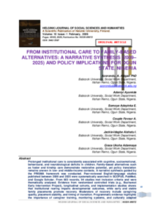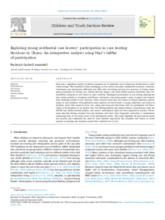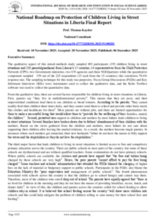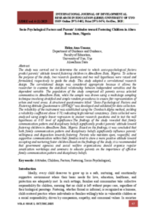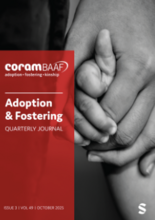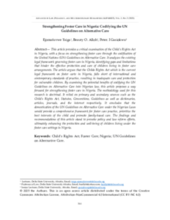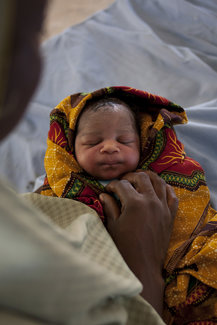

Displaying 1 - 10 of 634
This article tells the story of Nigerian missionaries Olusola and Chinwe Stevens, who have spent three decades rescuing babies and young children in central Nigeria from harmful traditional beliefs that label them as “cursed” and sometimes lead to
This article reviews global evidence on the impacts of institutional care versus family-based alternatives and examines how these findings inform foster care reform in Ogun State, Nigeria. It synthesizes research from 2009–2025 to identify key developmental outcomes, implementation lessons, and policy priorities for transitioning away from institutional care.
The piece argues that Lagos, Nigeria’s largest city, is mishandling the growing crisis of street children by relying mainly on enforcement actions — such as rounding up boys seen begging or washing windscreens along busy roadways
This qualitative study examines how young care leavers in Ghana are involved in decisions about their transition from residential care, revealing that despite national and international policy commitments, their participatory rights are often neglected. Findings show that care leavers frequently feel excluded or manipulated in key decisions, highlighting the need for more inclusive, rights-based approaches that recognize them as active partners in planning their post-care futures.
This mixed-methods study, drawing on qualitative and quantitative data from all 15 counties in Liberia, examines the drivers and scale of children living in street situations through interviews with children, parents, government, UN, and civil society actors.
This study examines how socio-psychological factors influence parents’ attitudes toward fostering children in Akwa Ibom State, Nigeria, using a correlational design and survey data from parents in urban and rural communities. Findings show that family communication patterns and disciplinary beliefs significantly predict positive attitudes toward fostering, highlighting the need for sensitization and education initiatives led by government and social welfare organizations.
This study explores the informal foster care practices of the Igbo ethnic group in South-East Nigeria, revealing both its cultural value in providing family-based care and the challenges it faces. Findings highlight the lack of regulation, data, and support services, underscoring the need for greater involvement of government agencies and social workers to ensure children’s safety and well-being.
In the piece, the Association of Orphanages and Homes Operators of Nigeria (ASOHON) Southern Nigeria chapter calls for stronger collaboration between orphanage operators, government agencies and other stakeholders to build a more inclusive, family
This article provides a critical examination of the Child's Rights Act in Nigeria, with a focus on strengthening foster care through the codification of the United Nations (UN) Guidelines on Alternative Care. It analyzes the existing legal framework governing foster care in Nigeria, identifying gaps and limitations that hinder the effective protection and care of children living in foster care arrangements.

